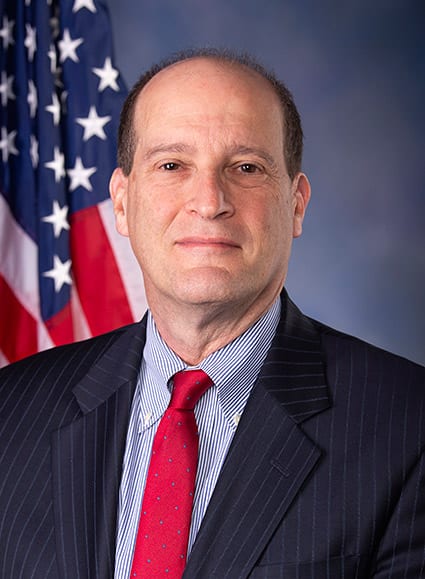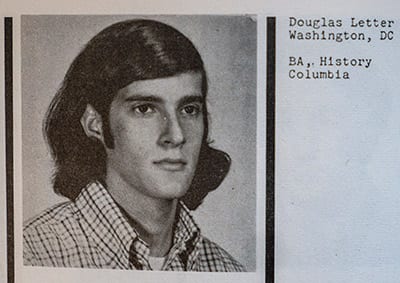By Andrew Cohen

Douglas Letter ’78 wasn’t looking for a searing hot spotlight. But when House Speaker Nancy Pelosi asked him to become general counsel of the House of Representatives a year ago, he knew the job could vault him into the public eye.
Still, no one could have anticipated the firestorm of attention that has swept his way. As an integral part of the House’s team prosecuting the impeachment trial of President Trump, Letter is now front and center in an intriguing chess match—with an insatiable news media blaring every detail.
During a 40-year stint at the Department of Justice, where for years he directed the Civil Division Appellate Staff, Letter presented legal arguments on behalf of administrations both Democrat and Republican. Now, he is embroiled in a hyper-partisan showdown.
Just a few of his far-reaching efforts: fighting to obtain the grand jury material included in and underlying Special Counsel Robert Mueller’s report following his probe into Russian interference in the 2016 presidential election, suing former White House Counsel Don McGahm to force him to testify, and advancing various efforts to obtain Trump’s tax returns and financial records.
Letter recently took time out of an absurdly busy schedule to describe his current roller-coaster ride, his working relationship with Speaker Pelosi, and his Berkeley Law memories.
AC: In February 2018, you retired after four decades at the Department of Justice. What prompted you to jump back in, at full throttle, a year later?
DL: I was teaching at Georgetown Law and working for a public interest litigation institute. I figured I’d be doing that for quite a while, but when I was asked to consider becoming House counsel … I talked to some people on Nancy Pelosi’s staff, and it sounded like this could be extremely interesting. During the interview with her, it felt like it would be really fun to work together. I knew we’d be doing very fun, interesting, and important work.
AC: Given everything on your plate, how do you juggle everything that needs to be done?
DL: Sadly, I can’t juggle; I wish I could. I have a staff of nine attorneys and whenever I get authorized to participate in litigation, I can retain other attorneys either for pay or pro bono. It’s all been pro bono—we’re not spending a dime of taxpayer money. There’s a whole batch of private firms and public interest litigation groups who are working for me. That’s the secret.
AC: What’s the biggest challenge of your job?
DL: Learning a whole new environment and way of doing things. While I’ve been doing litigation for the United States for 40 years, I’d never worked on the Hill. I had plenty of dealings with the House when I was at the Justice Department, but now I’m learning how the various committee structures work, the Speaker’s relationship with committee chairs, how the House goes to court. And I spent the first several weeks getting lost. There are a lot of big buildings with lots of tunnels connecting them. It’s been a scramble to be on time for meetings.
AC: What’s something about Nancy Pelosi that most people don’t know?
DL: I recently learned she’s a major Grateful Dead fan. I grew up going to Grateful Dead concerts, and it’s terrific to realize I’m working with another Dead-Head. I’m also a major Giants, 49ers, and Warriors fan and she’s very interested in all these teams. It’s been fun bonding over the 49ers’ resurgence this year. And she’s not a lawyer, but she’s whip-smart and an amazingly quick study.
AC: Having worked for administrations from both parties, does that help you stay calm and measured amid this bitterly partisan impeachment battle?
DL: Definitely. Because of the major stonewalling by the administration, there are times it can be challenging. A big problem for me personally, frankly, has been doing a considerable amount of litigation against the Justice Department—against people who are good friends of mine, many I’ve hired and trained. Appearing against these former colleagues isn’t always easy to navigate.
AC: It seems like you genuinely love being a lawyer. What about the profession do you most enjoy?
DL: I’ve always liked going to court. I especially love doing court appearances when there are very intelligent and interested judges asking you difficult questions. I get such a rush from doing that. There’s also an intellectual fascination working on issues that haven’t been definitively resolved. It’s fascinating to ask, “What did the Framers of the Constitution intend when they put the Impeachment Clause in the Constitution?” I’m working a ton of hours and enjoying every minute of it.
AC: On that note, is it true you sleep just four hours a night, and if so what’s your secret for staying alert and productive?
DL: I nap during meetings, just doze right off. No, seriously, I’ve always been someone who doesn’t get much sleep and I’m fine on four hours a night. People vary. It’s not like I practice weird rituals to maximize my output. I do have a few things that keep me sane: I play a lot of tennis, I bike to work most days in the spring and summer, and I play basketball once a week.
AC: You’ve been profiled in the Washington Post and on CNN.com, among other major media outlets. What are journalists getting right about you, and what are they getting wrong?

DL: Well, one article described me as wearing a “nondescript suit” … which was correct. I’ve been a public servant my whole adult life, so I do wear nondescript suits, which is all I can afford. Actually, the media coverage has been really good, I have no huge complaints. I find that they get it right. I can’t do any press, but had permission to do this interview because it’s my alma mater. The main things the media relays about me are based on what I write in my case filings or what I say in court.
AC: What sparked your decision to go to law school, and why Berkeley?
DL: The Berkeley part is easy. I grew up in Palo Alto, and Berkeley was by far the best law school I got into. As a California resident, at that time I think I was paying literally a couple hundred dollars a semester. Berkeley was a good place for people who strongly believed in public service. The law school had and has a great reputation. I hope everyone would agree it’s the best public law school in the U.S. and that Berkeley is the best university in the world.
As for becoming a lawyer, my father was a public servant and a career lawyer who loved his job. I had a good friend at the Justice Department, and decided to give it a try. I got into court almost immediately and the unit I joined did really interesting cases from all over the country. It was great representing the U.S. in federal courts and getting to do a Supreme Court argument less than five years in.
AC: What advice would you give law students today who want to work in Washington?
DL: The UCDC Law Program that’s available to Berkeley Law students is great. I’ve lectured there and am going back in February. All the students I talked to there had good internships and were doing interesting work. My other advice is to try to get a summer position here. Those are very valuable. My interns get tons of responsibility and it’s the same at the Justice Department. And I know Berkeley pays a ($5,000) stipend for otherwise unpaid summer public interest work.
AC: What was your most meaningful moment as a Berkeley Law student?
DL: By far the most memorable part of my experience were the fellow students. I made really good friends with extremely fun, interesting, and admirable people. We were thrilled to be part of this university that was and still is the pride of California.